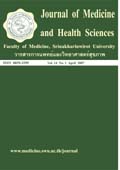Rotavirus infections : An etiology of diabetes mellitus type 1
Keywords:
diabetes mellitus type 1 / autoimmunityAbstract
During the last decades, the incidence of diabetes mellitus type 1 (DT1) has increased significantly, reaching of 3% annually worldwide. This increase suggests that in addition to genetic factor, environmental factors are also involved in the pathogenesis of DT1. Childhood viral infections including rubella, mumps, parvovirus, cytomegalovirus, enterovirus, coxsakie and rotavirus have been associated with DT1, establishing the onset of autoimmunity. The pathogenesis of DT1 is that altered immune responses lead to a selective destruction of insulin-producing beta cells in genetically susceptible individuals. Rotaviruses (RV), which are the main cause of diarrhea in children, seem to have a role in induction of DT1 since there is a persistance of RV in the pancreas. Molecular mimicry, epitopes spreading, bystander activation, viral specificity to T cells, increasing intestinal permeability were hypothesized to account for RV ability to induce autoimmunity to destruct beta cells and cause DT1. Understanding of etiologic mechanisms will lead to the development of strategies to prevent DT1 in the future.Downloads
Published
2009-07-13
Issue
Section
Review Article


